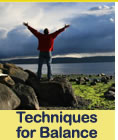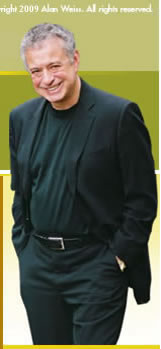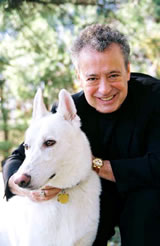    
Joyous Holidays and Happy New Year to All! Balancing Act: The Newsletter (No. 124: December 2009) Follow me on Twitter! You can find me here: New consulting and leadership tips posted daily! And find me on Facebook: 
The express train to get through your day:

The best return on investment that I know of is in ourselves. Yet, we seem to make that investment last, or not at all. It may be a belief that we're already pretty good, or that it's selfish, or it may be a perverse martyrdom, but that's usually the case. Inhering somewhere in our DNA is the belief, assumption, commandment, or guilt that we have no right to invest in ourselves unless and until everyone else is doing just dandy. In other words, never. When I was chair of the planning board here, I would get into collegial debates with town council members about what the priorities should be. Several were strict sequentialists. That is, they thought you had to follow the numbers, priority one, leading to priority two, and so on. In that system of thinking, of course, the lower priorities were never attended to. And when they were something like providing more money for homeless animals, or putting up holiday decorations, it didn't make sense that we wait until every street were perfectly paved and every school textbook was the latest edition. Life happens concurrently. Otherwise, no one would be talking about "multitasking." Consequently, consider an investment in yourself as a concurrent priority with whatever the rest of them may be for you. Like putting your own oxygen mask on first, the better off you are the more able you are to help others. That investment in self may be educational, recreational, comfortable, aesthetic, cosmetic, or any number of other improved conditions. I'm betting that the return you get will assist you in any number of other personal and professional priorities. I deal regularly with people for whom "the timing isn�t perfect," or "I want to wait until I have the cash," or "I�m too new and need better experience." Unless you invest in your own development, you may not have the best experiences, the timing will never be right, and the cash won�t exactly be overflowing. If you view yourself as a bank that pays huge interest, why wouldn�t you place your investment there? (And the hours of operation will usually suit your needs.) Acquire the coaching or mentoring that will take you to higher levels; invest in equipment and resources that will make you more productive; take the time to educate yourself in areas which will improve your value; explore places that will add to your perspective and sophistication. Recessions and lack of credit don�t affect self-investment. Only lack of self-esteem does. Would others consider investing in your bank? 
Salivation I learned this morning, alarmingly, that the dogs are not smarter than I am. I had been depending on them. I looked out the window to find a man cleaning the rear yard, as scheduled, but he was not our regular guy, though in uniform. Normally, our bridge alarm, which rings on two levels of the house, would have alerted me to a vehicle coming onto the property (as well as random deer and geese who choose to walk in). Apparently the batteries had died, and I missed his entrance. So did Koufax and Buddy Beagle. I suddenly realized that the dogs run to the hall window when they hear the alarm, decide if it�s friend or foe, and then bark mildly or viciously. (They ALWAYS bark.) But they were not using inherent hearing, smell, or sight to tell that we had visitors. They had learned to rely on the bridge alarm, which was much easier! They even had their favorite window to get a good view of the entire road up to the house. Thus, I was relying on two �sentinels� who in turn were relying on the same alarm that I could hear myself. I had no advantage, no backup! We�re all familiar with the experiments that have made animals salivate when a bell sounds, or a certain shape is displayed. We are all subject to this kind of subliminal salivation. The bridge alarm is supposed to make me react, and the dogs are superb at it. But what about other cues and triggers that really shouldn�t create the reaction they do? A certain person says a certain phrase and our blood pressure shoots over 200. We ignore the safety demonstrations on airplanes, but become irate when our food choice is no longer available (as if we�re on these planes for a culinary experience not to be missed). I tend to turn off my hearing when a politician of any party begins a sentence with the stentorian, �What the American people really want is�.� Whenever I see a huge �You are here� sign in a mall or theme park, my mind instantly goes blank, because I know I�m lost and I don�t know where �here� is. The Pavlovian reaction can blind us and make us deaf to what�s going on around us. We need to be more in the moment. After all, it only takes a few more, scant seconds to be sure what�s being said by the blowhard is really not important, that the offer is a scam and not a genuine opportunity, that the business deal is all talk and not something that could happen tomorrow. Woody Allen observed that, just because your paranoid, it doesn�t mean that no one is following you. If you�re salivating, it may mean that you�re merely responding to a meaningless stimulus, but it may also mean there is food in the vicinity. Maybe under your nose. 
I'm waiting in line, grumbling about how long the bank is taking to deal with its customers. I finally reach a teller. "This is enough to drive people from Citizens Bank to the competition," I gratuitously remark to the teller as I hand over my deposit. "Looks like we already have," she replies while studying my withdrawal slip, "your transaction is with Bank of America." 
|

Balancing Act® is our registered trademark. You are encouraged to share the contents with others with appropriate attribution. Please use the ® whenever the phrase "Balancing Act" is used in connection with this newsletter or our workshops. 2010 Teleconference Series
A powerful, exciting lineup for the coming year, with a huge discount IF you register by December 31 (no exceptions). For the first time we'll be dealing with setting priorities, living large, spirituality, creating communities, and much more. Free downloads and recordings of every session are included. The Art and Science of Process VisualsProvidence/Newport area, Feb. 3, 2010
For the first time ever, a full day on the creation, application, and extension of these powerful visuals to use in marketing, implementation, workshops, and elsewhere. Learn the three different ways to create them and depart with personalized process visuals of your own. Limited participation for this intense day. Million Dollar Consulting® CollegeNewport, RI,
|
| Having problems viewing this email, click
here. |
|
P.O. Box 1009 � East Greenwich, RI 02818-0964 � Telephone: (401) 884-2778 � Fax: (401) 884-5068
All Rights Reserved. Copyright 2009 Summit Consulting Group





